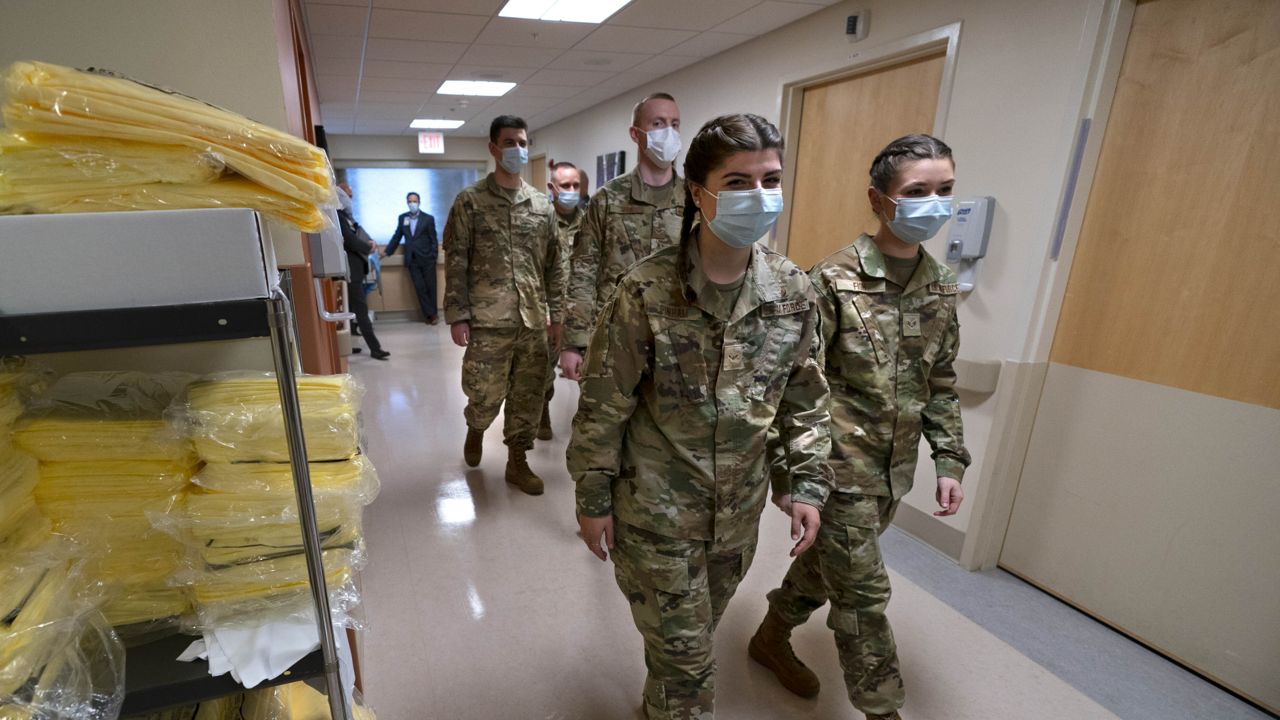Hospitals across the country have experienced surging COVID-19 caseloads in recent weeks, and some have been forced to call in reinforcements to aid the overburdened healthcare systems.
While the omicron strain of COVID-19 can be attributed to the spike in areas like New York, the Southeast, the industrial Midwest and the Pacific Northwest, other regions were already struggling thanks to the delta variant – and now face an even more dire winter thanks to omicron.
The first case of the omicron strain of the coronavirus was detected in California on Dec. 1; as of Tuesday, the variant surpassed delta as the most common strain of the SARS-CoV-2 virus in the U.S., accounting for 73% of new cases last week.
While there is still much unknown about the omicron variant, scientists say it is likely more transmissible than previous strains. Federal officials have warned unvaccinated Americans that they face a winter of possible severe illness or death, and even fully-vaccinated individuals are encouraged to get a booster shot of COVID-19.
Already, unvaccinated individuals have begun to overwhelm hospitals.
Massachusetts Gov. Charlie Baker announced Tuesday he will activate up to 500 members of the National Guard to support understaffed hospitals across the state facing a surge of COVID-19 patients and to bolster non-emergency medical transportation needs.
Up to 300 Guard members will begin training this week to provide nonclinical support at 55 acute care hospitals and 12 ambulance service providers, Marylou Sudders, state Secretary of Health and Human Services said at a news conference. They will be deployed Dec. 27.
The goal is to ensure that hospitals have sufficient capacity to care for both COVID-19 and non-COVID-19 patients.
“There’s no question the next few weeks will be enormously difficult for our health care community,” the Republican governor said.
Researchers on Monday said omicron had likely been the dominant variant in Massachusetts since at least Dec. 17, less than two weeks after the variant was first identified in-state.
According to data from Massachusetts’ Department of Public Health, unvaccinated individuals are around 31 times more likely to be infected with COVID than those who have received their booster shot of COVID-19.
Another study from the department, released on Monday, found that over 97% of all breakthrough cases in the state did not result in hospitalization, meaning the vast majority of those in the hospital are unvaccinated.
“The data indicates that fully vaccinated and boosted individuals are well protected from severe outcomes of COVID-19, including hospitalization and death, and the Department of Public Health strongly urges all residents to get vaccinated and, when appropriate, get a booster,” Acting DPH Commissioner Margret Cooke said of the results.
Last Friday, Ohio Gov. Mike DeWine announced more than 1,000 members of the Ohio National Guard would be ordered into hospitals overwhelmed by patients being treated for COVID-19, the vast majority of whom are also unvaccinated.
“Twenty-two months of this pandemic has taken its toll on our health care workers,” the Republican governor said, recounting stories of short-staffed hospitals needing workers to return for second shifts after only short breaks.
Of the Guard, 150 are medical workers — mainly nurses and EMTs — who will be assigned beginning Monday to hospitals largely in the Akron, Canton and Cleveland areas, which are seeing the highest hospitalization numbers. Most of those hospitals have stopped elective surgeries, and facilities elsewhere are considering the same, the governor said.
The omicron variant became the dominant strain in Ohio late Monday, officials said.
The state is facing a threefold challenge in still-surging cases attributed to the delta variant, the arrival of the faster-spreading omicron variant, and what’s predicted to be a normal flu season, DeWine added.
Still, not every state surge can be attributed to the omicron variant. Some states, like Maine, experienced record-high cases in the first two weeks of December thanks to the delta variant. The first cases of omicron were only identified in the state last Friday.
On Dec. 8, Maine Gov. Janet Mills announced she would activate more of the state’s National Guard to deal with the delta-spurred surge; a day later, she said President Joe Biden approved her request for additional Federal Emergency Management Agency (FEMA) assistance to supplement hospital staff.
While omicron is now responsible for an estimated 90% or more of new infections in the New York area, the state National Guard in early December deployed 120 Army medics and Air Force medical technicians to 12 nursing homes and long-term care facilities to relieve fatigued staff.
The federal government on Tuesday announced it would also supplement state hospitals, and is prepared to deploy an additional 1,000 troops with medical skills to assist hospitals buckling under the virus surge.
Additionally, the administration is immediately sending federal medical personnel to Michigan, Indiana, Wisconsin, Arizona, New Hampshire and Vermont. There are also plans to ready additional ventilators and protective equipment from the national stockpile, expanding hospital resources.
